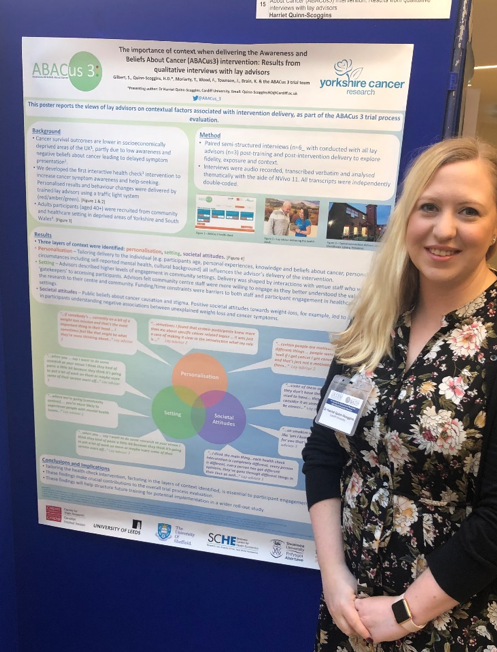 15th Annual Scientific Meeting of theUK Society of Behavioural Medicine
15th Annual Scientific Meeting of theUK Society of Behavioural Medicine
Blog post by Dr Harriet Quinn-Scoggins, PRIME Research Associate, Cardiff University (pictured opposite)
3 February 2020
In mid-January I attended the UKSBM (UK Society of Behavioural Medicine) ASM in Bath at the Apex City of Bath Hotel Conference Centre. UKSBM is an interdisciplinary society focusing on the development and integration of environmental, behavioural and biomedical knowledge relevant to health and disease; and the application of this knowledge to prevention, treatment and rehabilitation. This year the society and organising committee decided not to limit the conference content to a specific theme with the symposia reflecting the broad focus of contemporary research in behavioural medicine including:
- Promoting health behaviour change: including physical activity, diet, weight loss, and alcohol, tobacco and other substance use
- Applications of behaviour change theory
- Evaluating complex interventions
- Addressing health inequalities through Behavioural Medicine
- Transport, pollution and health
- Systems approaches to obesity and non-communicable diseases
- The role of industry in health and health services
As you can imagine this led to a very varied schedule of presentations and engaging discussions between the interdisciplinary group.
The invited keynotes also covered a varied spectrum of important topics from ‘The Psychology of Repetition: Habits of Doing and Thinking’ (Prof Bas Verplanken, University of Bath) to ‘The global food system is broken: What can we do to move towards more sustainable diets?’ (Prof Jennie Macdiarmid, University of Aberdeen).
With our PRIME work package in mind (WP4, Cancer Screening, Prevention and Early Diagnosis) I attended the parallel breakout sessions on ‘Cancer: screening, vaccination and intervention’ and ‘Smoking and smoking cessation’. In the second of these parallel sessions PhD student Pamela Smith delivered a great presentation on ‘Recruitment of hard-to-reach smokers using a social media strategy’. Both sessions stimulated interesting discussion on future of these streams of work, how work in these areas can be successfully implemented in practice and how best to engage the hard-to-reach populations that we work with.
I was also fortunate to have been invited to submit a presentation, alongside Dr Rachael Murray (University of Nottingham), for a symposium on ‘Promoting changes in health behaviours within cancer screening setting’ (Convenor Prof Annie Anderson, University of Dundee; Discussant Prof Bob Steele, University of Dundee) which was accepted. Rachael and I presented on the background of smoking cessation delivery in the context of lung health checks and preliminary results on participant acceptability from YESS (Yorkshire Enhanced Stop Smoking Study). The presentation went very well and the symposium ignited some interesting discussions on the direction of lung health checks in the UK, and how as researchers across the UK we can start implementing some of the accrued evidence base we have on integrating behaviour change interventions at cancer screening.
I am also thankful to have had the opportunity to present an ABACus 3 poster titled ‘The importance of context when delivering the Awareness and Beliefs About Cancer (ABACus 3) intervention: Results from qualitative interviews with lay advisors’. The poster incited further questions about findings from the wider trial process evaluation and there was a buzz about the imminent trial results.
Over one of the lunchtimes the UKSBM ECN (Early Career Network) also met, and there was a meeting to discuss the possibility of setting up new Special Interest Groups - so watch this space!
So as Prof Annie Anderson welcomed us ‘here’s to the first conference of the new decade’. I believe everyone who attended had a great time and left feeling invigorated to get back to work – we certainly did!
A special thank you to Rachael for securing funding for my conference attendance fee, and to PRIME Centre Wales for covering my travel and accommodation.
If you have any questions about UKSBM or are interested in possibly attending next year and have any questions please feel free to send me an email (quinn-scogginshd@cardiff.ac.uk) or come and see me. If you have any questions about the ECN then please feel free to contact Dr Grace McCutchan (Research Associate in our WCRC sister centre, mccutchangm@cardiff.ac.uk) who is a UKSBM ECN committee member.

